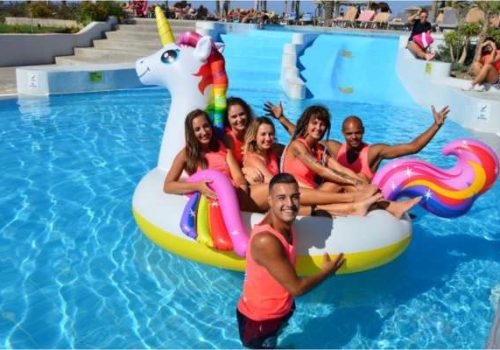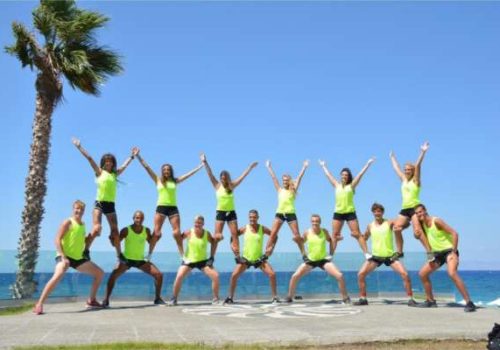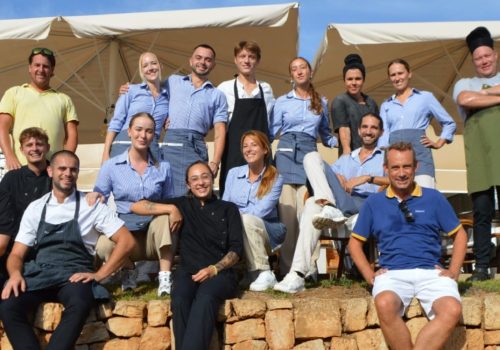Living and Working in Poland
Information & guidance about seasonal jobs in Poland
Poland borders Germany, the Czech Republic, Slovakia, Lithuania, Belarus and Ukraine. The capital of Poland is Warsaw. Other major cities include Krakow, Lublin and Poznan. Poland is a country known for its many old towns, has over 23 national parks and here you will also find the city of Łódź where you will come across over 180,000 Jewish graves. A trip through Poland also means a very unique journey through Polish history and beautiful nature. The extraordinary landscapes, colourful gardens and impressive temples. What Poland is also very proud of is its medieval architecture. In addition, Poland is also characterised by its quaint old towns, fine sandy beaches, rugged forests and vibrant city life. Krakow, in particular, is one of Europe’s most impressive cities. Mainly because of its magnificent historical buildings. Visiting Poland sheds light on some of the most serious events in history. Further curious about what it is like to live and work in Poland? Read on quickly!
Seasonal jobs in Poland
We don’t have any jobs matching this search. Below you’ll find a selection of our most popular vacancies!
- Adventure jobs, Hotel jobs, Tourism
- Bulgaria, Croatia, Egypt, Greece, Italy, Spain, Turkey
- Hotel jobs, Tourism
- Cyprus, Greece, Spain
- Adventure jobs, Ski & Snowboard Instructor, Ski & Winter Resort, Tourism
- Canada, Japan, New Zealand, Switzerland, United States
- Tourism
- Cyprus, Greece, Spain
- Hotel jobs, Tourism
- Cyprus, Greece, Spain
- Chef & Cookery, Hotel jobs, Tourism, Waitress-Waiter
- Spain
Facts about Poland
Language: Polish
Currency: Polish Zloty
Capital: Warsaw
Population: 40.2 million inhabitants
Famous for: Love of beer!
An interesting fact: Poland has beaches, mountains, forests, deserts and lakes!
Working in Poland
Advantages of living and working in Poland
Poland offers a unique blend of professional opportunities and a rich cultural experience, making it an increasingly popular destination for expats. The country boasts a dynamic economy, with a growing job market in sectors such as IT, finance, engineering, and manufacturing. Competitive salaries, especially in major cities like Warsaw, Kraków, and Wrocław, are paired with a relatively low cost of living, allowing for a comfortable lifestyle even on modest incomes.
Poland’s central location in Europe is another advantage, providing easy access to neighboring countries for work or leisure travel. The country also has a strong public infrastructure, with reliable healthcare and education systems that cater to both locals and expatriates. For families, Poland offers affordable childcare and international schools in urban centers.
Culturally, Poland is rich in history, traditions, and natural beauty. From vibrant cities with historical landmarks to picturesque countryside and mountains, there’s always something to explore. The people are known for their hospitality and resilience, making it easy for newcomers to integrate into the local community. With its combination of economic potential, cultural heritage, and a welcoming environment, Poland is an ideal destination for those seeking both personal and professional growth.
Work culture in Poland
Working hours in Poland are identical to those in the Netherlands or Germany. Generally, people work 40-hour weeks full-time. Furthermore, the country has 15 national holidays (or days off).
What immediately stands out in Poland is the warm and hospitable attitude of colleagues. Upon entering the Polish working environment, you can count on a firm handshake, followed by genuine interest in you as a person.
When moving to Poland, it is important to understand the work culture. Poles value professionalism and punctuality, so make sure you are on time and show respect for hierarchy. Communicate clearly and directly, but with politeness. It is also helpful to have some knowledge of the Polish language and traditions, which is appreciated in business interactions. Showing interest in the local culture and adhering to professional standards will facilitate your integration and foster nice working relationships.
How to find a job in Poland?
To find a job in Poland, there are several things you can do. First of all, it is useful to check online job sites such as Pracuj.pl and LinkedIn, where many Polish employers post their vacancies. In addition, you can contact recruitment agencies that specialise in the Polish job market. Networking is also important in Poland, so take advantage of professional events, workshops and social gatherings to make contacts. Make sure your CV is up-to-date and written in Polish or English, depending on the requirements of the position. Finally, it is useful to actively approach companies you are interested in and send open applications yourself. Showing commitment and interest in the local job market can increase your chances of finding a job in Poland.
Salaries in Poland – What to expect?
Salaries in Poland have experienced consistent growth, mirroring the nation’s robust economy and the rising demand for skilled professionals. While wages may not align with those in Western Europe, the lower cost of living ensures a comfortable lifestyle and substantial purchasing power.
The average gross monthly salary in Poland is approximately €1,500. However, earnings vary significantly based on industry, location, and expertise. IT professionals are among the top earners, with average monthly salaries ranging from €2,150 to €4,300. Finance and banking professionals typically earn between €1,700 and €3,200, while engineers and technical experts can expect salaries of €1,300 to €2,600.
In sectors such as hospitality, retail, and administrative work, salaries are more modest, ranging from €750 to €1,100. Teachers and educators earn around €850 to €1,300, though those in international schools or with specialized skills may earn more.
Location significantly influences salaries. Major cities like Warsaw, Kraków, Wrocław, and Gdańsk tend to offer higher wages compared to smaller towns and rural areas. For instance, in Warsaw, salaries are often 20-30% higher than the national average due to the concentration of multinational companies and higher living costs.
It’s also important to consider taxes and social contributions, which are deducted from gross earnings. Poland employs a progressive income tax system, with rates of 12% and 32% depending on income levels. However, tax-free allowances and employer contributions to social insurance help to offset some of these deductions.
Overall, while salaries in Poland may seem modest by Western European standards, the combination of competitive wages in certain sectors, affordable living costs, and opportunities for career growth makes the country an attractive destination for professionals seeking new opportunities.
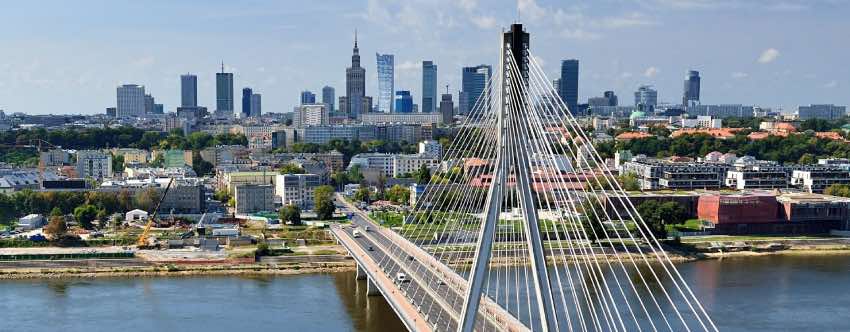
Moving to Poland: A Guide for Expats
Relocating to Poland is an exciting opportunity to experience its vibrant culture, thriving economy, and welcoming communities. Whether you are moving for work, study, or personal reasons, understanding the key aspects of settling in will make your transition smoother.
Residency and Visas:
EU/EEA citizens can move to Poland without a visa and stay for up to 90 days. For longer stays, you need to register your residency at the local voivodeship office. Non-EU nationals generally require a visa to enter Poland, followed by a temporary residence permit for stays exceeding three months. Your employer can often assist with the required documentation for work-related relocations. Applications for permits are handled by the local immigration office.
Finding Accommodation:
Poland offers a range of housing options to suit different budgets and lifestyles. Major cities like Warsaw, Kraków, and Wrocław have a mix of modern apartments, historic flats, and suburban houses. Rental costs vary depending on location; for example, a one-bedroom apartment in Warsaw can range from €600 to €900 per month, while smaller cities may offer similar options for €400 to €700. Real estate platforms and local agents are the most common ways to find housing. Be sure to sign a rental agreement and clarify utility costs, as these are often not included in the rent.
Cost of Living:
Poland’s cost of living is relatively affordable compared to Western Europe. Groceries, public transport, and entertainment are reasonably priced, making it easier to budget. For example, monthly transport passes cost about €25-€35, and a meal at a mid-range restaurant averages around €10-€15. While living in big cities like Warsaw is slightly more expensive, the overall affordability remains attractive for expats.
Language and Integration:
Polish is the official language, and while English is widely spoken in urban areas and among younger generations, learning basic Polish phrases can help you integrate and navigate daily life. Many cities offer language courses for newcomers. Polish people are known for their hospitality, and making an effort to connect with the local community can enhance your experience.
Healthcare System:
Poland provides quality healthcare through its public system, which is funded by mandatory health insurance contributions. If you are employed in Poland, you will automatically contribute to this system and gain access to public healthcare services. Private healthcare is also widely available and offers faster service, with costs typically covered by private insurance.
Work and Career Opportunities:
Poland’s robust economy creates opportunities for professionals across various sectors. Cities like Warsaw, Kraków, and Wrocław are hubs for IT, finance, and engineering jobs. The country’s business-friendly policies and growing job market make it an attractive destination for skilled workers.
Cultural Life and Recreation:
Poland’s rich history and culture are evident in its architecture, museums, and festivals. Major cities host diverse cultural events, while the countryside offers breathtaking landscapes, including mountains, forests, and lakes. Whether you enjoy hiking, skiing, or exploring historic towns, Poland has something for everyone.
Moving to Poland can be a rewarding experience, offering a high quality of life, a strong economy, and a rich cultural heritage. With some preparation and an open mind, you’ll quickly find your place in this dynamic and welcoming country.
Living in Poland
Accommodation in Poland
When it comes to accommodation, in Poland you can easily rent a one-bedroom flat between €200 and €500 per month. Rental prices in Warsaw, while a bit higher by Polish standards, are lower than in major cities in the Netherlands. For example, the rent of a two-person flat costs around €500 to €1000 per month. A large proportion of housing offers can be found in Polish newspapers, such as the Gazeta or Gratka. Another website suitable for finding accommodation in Poland is: HousingAnywhere.
Nice neighbourhoods in Warsaw are: Wilanów, Śródmieście and Praga.
Nice neighbourhoods in Kraków are: Kazimierz, Podgórze and Gregorski.
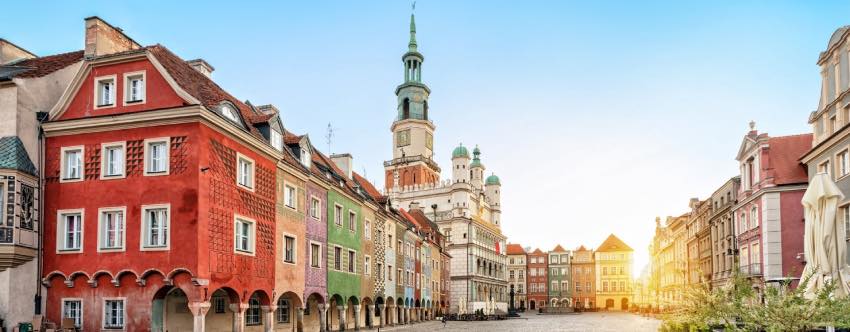
Transport in Poland
Poland has 15 international airports. It also has a road network of more than 400,000 kilometres, and a large rail network. It has public transport, such as trams in cities like Warsaw, Krakow, Lodz, Wroclaw, Poznan and Gdansk.
A one-month pass for public transport in Poland costs €22, while a one-way ticket costs just €0.7.
Eating in Poland
Polish cuisine is mouth-watering and traditionally rich in meat and pasta (or pierogi). Although there are many local differences between regions in Poland, there are a number of national delicacies, including many different types of soups and potato dishes.
In winter, Poles eat hot soup and in summer they eat cold soup. Chodnik, for example, is a cold soup with chives and eggs. Poles also like to eat cheese, meat and sweets. Ingredients commonly used in Polish cuisine are cabbage, potato, mushrooms, pork, sour cream and cottage cheese.
Traditionally, Poles are also heavily involved in brewing alcoholic drinks such as mead made from honey , beer, wine and vodka. The cost of a shot of vodka is just €1, while a (0.5l) beer in a pub/restaurant costs an average of €1.65.
Nightlife in Poland
Poland is incredibly fun and vibrant for going out. When you go out in Kraków, it mainly means very cosy pubs, trendy clubs and fun people. With its many students and cheerful tourists, it is possible to go out in the city every night. It is said that Cracow has the highest pub density in the world. Especially the Jewish quarter of Kazimierz is incredibly vibrant in this respect.
Warsaw also guarantees an unforgettable night out for all audiences. Whether you are looking for a homely bar, a cosy café, a restaurant with live music into the night or a nightclub… In Warsaw you will find everything!
Poland’s landscape and nature
Mother nature has gone wild in Poland! Are you a true nature traveller or birder? Then you can focus mainly on the north-east of the country. In this remote corner are well-known nature reserves such as Biebrza with its beautiful river and marshes. And Bialowieza with Europe’s last primeval forests.
You will find as many as 23 national parks in Poland, some of which are included in the UNESCO World Heritage List.
The most famous nature reserve then is Bialowieza National Park. This immense nature reserve lies against the border of Russia. The Biebrza River with pure and clear water flows through this area and creates numerous swamps where you can encounter bison, bears, wolves and lynxes. These also roam the Tatra mountains. With its steep mountains, valleys, caves and lakes, it is an ideal destination for the adventurous hiker.
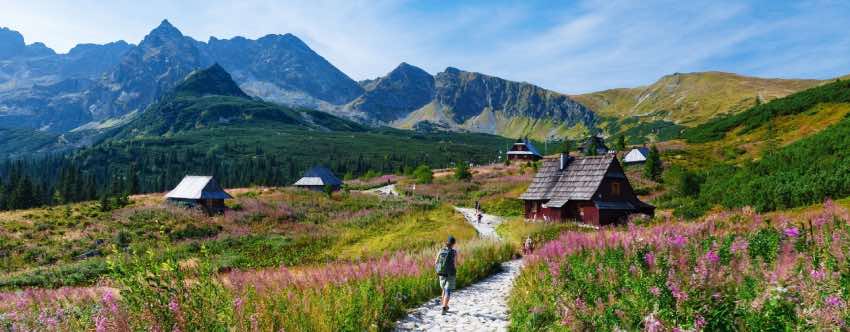
What not to miss in Poland
Krakow
The Polish city of Krakow, located in the south, is also widely visited as a city break. The atmospheric city centre ‘Stare Miasto’, registered with Unesco on the World Heritage List since 1978, offers a variety of sights. For example, discover the beautiful historical architecture from the 13th century. And St Andrew’s Church is even older! The city also boasts a cathedral, the ‘Wawel Cathedral’, a magnificent cloth hall ‘Sukiennice’, a number of fascinating museums such as the MOCAK, a super cosy big market ‘Rynek Głównu’ and, as described earlier, Kraków’s nightlife is incredibly vibrant. This city is also home to a large number of students.
Auschwitz
World War II caused an awful lot of suffering and family tragedies. The Auschwitz concentration and extermination camp in the Polish town of Oświęcim witnessed this. It is incredibly sad that more than a million people were deported here. Most of them sadly perished. After World War II, Auschwitz became the symbol of the Nazi regime. Today, you can voluntarily walk in and out of Auschwitz concentration camp and see with your own eyes all that the victims went through. You can join a guided tour where everything about the atrocities is told. You can also visit the different rooms. These include the gas chambers and incinerators.
Warsaw
Warsaw is the capital and lies just east of Poland. The city is split by the Wisła river. On the left bank is the centre of Warsaw and on the right bank is the Praga district. The most interesting sights are on the left bank in the city centre. These include St John’s Cathedral and Wilanów Palace. On the right bank in Praga, you can visit the ‘Muzeum Warszawskiej Pragi’. This modern museum has all sorts of interesting facts, objects and toys in its collection. This way, you can get acquainted with the city. And Warsaw also has a nice vibrant nightlife. You won’t get bored in Warsaw anyway!
Wieliczka salt mine
This is the oldest salt mine in the world with a history dating back many centuries. The salt mine has therefore been a source of income for centuries. Salt has not been mined for a long time, but people still make money there. Especially since the second half of the 20th century, when the salt mine was placed on Unesco ‘s World Heritage List. Deep below the surface, the diverse rooms are decorated with salt sculptures. The Wieliczka salt mines is definitely something not to be missed in Poland!
Jewish graves in Łódź
The centrally located Polish city of Łódź is actually known as an industrial city. Although slightly less developed than cities like Kraków and Warsaw, Łódź has a certain charm. Piotrkowska street and the museum ‘Muzeum Sztuki w Łódzi’ are worth visiting. Łódź is most visited for its impressive Jewish graves. This cemetery ‘Cmentarz żydowski’ has been located on the Bracka since 1892. Some 160,000 people are now buried there.


